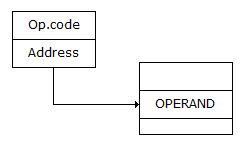ECE :: Microprocessors
-
Which of the following is not treated as hexadecimal constant by assembler in 8085?
-
If CS = A15 A14 A13 is used as chip select logic of a 4 K RAM in 8085 system, its memory range is
-
Consider the following part of a C program float a, b
b = (a > 4 ? 2 : 9);
Assuming that a has values of 3 and 6, the values stored respectively will be -
Consider the following operation in a computer
- Multiplication of scalar
- Iversion of matrix
- Printing a line of 120 characters on a printer
-
The addressing mode depicted in the given figure is

-
An I/O processor controls the flow of information between
-
When .9432 E - 4 is subtracted from .5452 E - 3 in normalized floating point mode
-
DS directive in 8085


 Whatsapp
Whatsapp
 Facebook
Facebook

